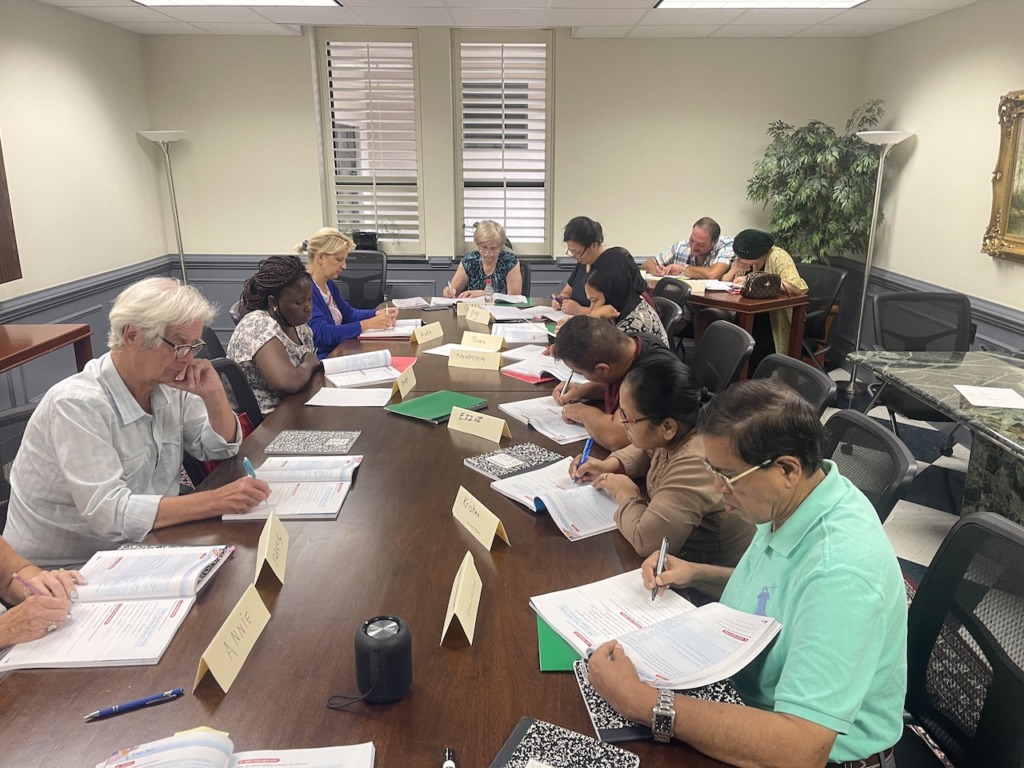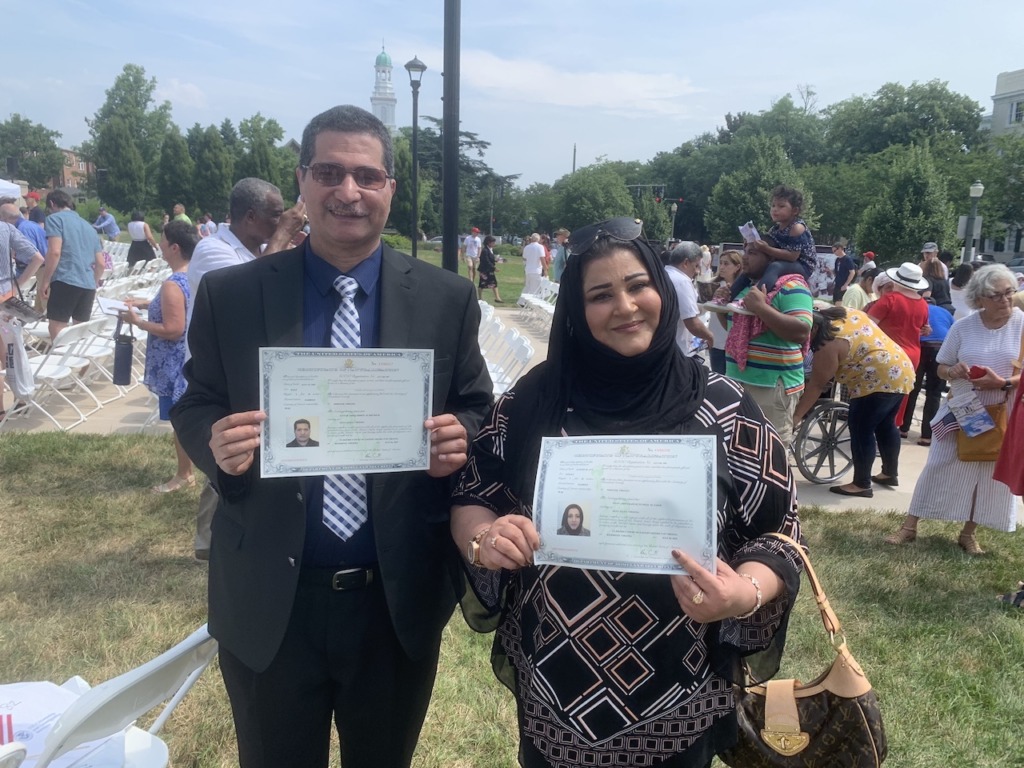Saint Mary’s ‘welcomes all’ through ESL, citizenship classes
Seated around a long rectangular table at Saint Mary’s Catholic Church, Richmond, are a woman from Ukraine, another from Afghanistan, a man from France, a woman from Peru, and
a handful of others, each from a different country, but all sharing a common goal: to learn English.
From all corners of the globe, they have come to the United States in search of a better life. Many have fled war, famine, genocide and persecution and somehow all ended up sitting at the same table, looking at the same unfamiliar words written on the same whiteboard.
Saint Mary’s has offered ESL (English as a Second Language) classes since 2014, but has been involved in refugee resettlement for decades. First helping refugees from Vietnam and Cambodia during the 1970s, Saint Mary’s continues to offer support to those seeking refuge in the United States.

There are multiple weekly ESL classes offered for students, ranging from Low-Beginner to Advanced. Some students attend classes for a few months, and others return year after year. While most students have some grasp of the language, none are turned away for lack of knowledge. Saint Mary’s has a dedicated team of instructors that strives to find a place for anyone looking to learn, regardless of their faith.
Supporting, not imposing
Jon Kraimer has been with the program since its beginning and has helped dozens of students over the years. He continues to find joy in each class.
“Seeing a face that suddenly understands something never gets old,” he said.
Kraimer explained that Saint Mary’s utilizes a workbook series with a multi-level progression that can meet the needs of a range of skill levels.
Though there is a set curriculum, there is still a certain amount of freedom in the class to allow
for open conversation related to daily life, cultural observations, and individual questions. This can be anything from popular films to departments of the federal government to understanding how to read parking meters.
In-class discussions are a vital component of the class. Students can also attend virtual classes or get one-on-one help completing employment, housing, and education applications.
Kraimer sees the program as a way to put his faith into action without imposing his faith on anyone.
“Treating all as brothers and sisters and children of the one God is at the heart of Christian faith,” he said, adding, “I hope that the example of caring and helping will lead people to do the same, and the fact that it’s being done by Christians without prerequisites will give them an introduction to our faith.”
Wendy Arroniz, another long-time ESL instructor, recognizes that each student’s needs are unique.
“The important part in connecting with another person is to try to understand where that person is coming from,” she said. “Introductions, questions about their lives, encouraging them to try to speak, and sharing stories about myself as well are important in building rapport. It’s about meeting people where they are.”
Once basic conversational skills are covered, students are then introduced to more advanced concepts and vocabulary, including different types of weather, past tense verbs, and contractions.
Students practice having conversations with the instructor and each other to ensure everyone understands the material before moving on.
“We hope to help immigrants and non-native speakers improve their lives with a better ability
to communicate, thereby helping them to participate more in community life, and find better opportunities for themselves with work and all aspects of life,” said Arroniz.
Moving toward citizenship
Once their ESL lessons are completed, some students continue their education by taking U.S. citizenship classes, which are also offered at Saint Mary’s.
Larry Spurzem worked as a high school English teacher for many years and now teaches the citizenship class at Saint Mary’s. He said he enjoyed it because he loves seeing the camaraderie students build throughout the sessions, overcoming any cultural barriers that may have existed at the beginning.
Speaking of his recent class, he said, “There were nine students from seven countries. What’s interesting is how those in the class interact with each other. It takes a couple classes, but after a time they talk among them- selves, and by the end, they’re a family.”
The classes are free of charge and consists of 12 two-hour sessions held twice a week for six weeks.
There are 100 civics questions Spurzem goes over in class. Beyond merely providing the answers, Spurzem tries to educate his students on the nuances of U.S. history and government, at the federal and state level. He also works with them to improve their English reading and writing skills, which are essential for the citizenship test.
The U.S. citizenship test takes place at a United States Citizen- ship and Immigration Services facility. The applicant is asked a maximum of 10 random questions from the 100 discussed in class and must answer six correctly. It costs $765 to apply for citizenship, which allows for two attempts to pass the test.
Spurzem said that it’s often a moving moment once someone passes the test, and even more meaningful once they finally pledge their oath to their new country. This is true not just for the newest American citizen, but for their teacher as well.
“I get to know these people, and sometimes their family members,” said Spurzem. “Knowing the time they’ve invested in this class and how I’ve gotten to know them, it’s an emotional experience seeing them reach their goal.”
Rebecca Oxenreider, the parish’s Minister of Human Concerns, Social Justice, and Community Life, explained, “One of the reasons I became Catholic was that when Bishop Sullivan met with families who were going to sponsor refugees from Cambodia and Vietnam, what he said was: ‘This is not about making Buddhist people into Catholic people. This is about standing in solidarity with sisters and brothers throughout the world who are hurting. Our task is to try to live our lives the way Jesus asks us to – in doing that, people will ask, and then, it becomes their journey.’ So, we welcome all people.”
Editor’s note: If you are interested in volunteering as a teacher or learning more information about these programs, please contact Rebecca Oxenreider at [email protected].

